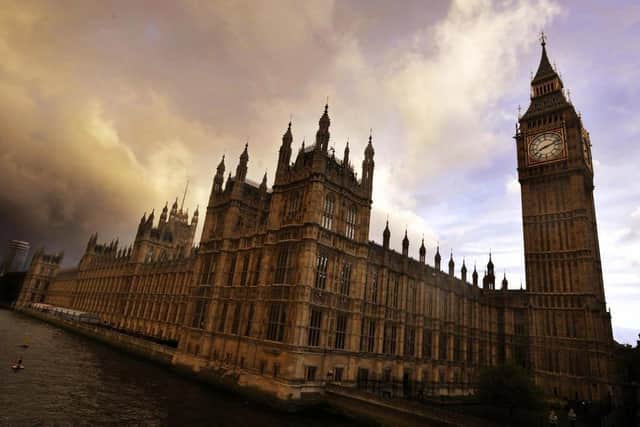Move Parliament from London to Leeds to level up the country - Huddersfield's Sam Bright
Taken in the context of a cost of living crisis, the cash required to renovate the Palace of Westminster – variously estimated at between £12 billion and £20 billion – is an additional affront to the British public.
If politicians want to rebuild the trust of voters, and save us some money in the process, Parliament should be moved closer to the people. Leeds would be my first choice.
Advertisement
Hide AdAdvertisement
Hide AdAs academic Danny Dorling has suggested, the cost of the Palace of Westminster repairs and of procuring new offices elsewhere could easily be met by selling prime Whitehall real estate.


“Downing Street would make a very nice boutique hotel,” he says.
The man at the centre of the scandal, Boris Johnson, was forged in institutions distant to most people – at Eton College and the Bullingdon Club at the University of Oxford – the latter infamous for its after-hours debauchery. Eton’s motto is Floreat Etona (‘may Eton flourish’) and there’s no doubt that the man barricaded in 10 Downing Street has absorbed the narcissism of his alma mater.
But this is not just about individuals. Schooling tells us much about the current nature of British society, its inequalities and idiosyncrasies.
Advertisement
Hide AdAdvertisement
Hide AdI went to Greenhead College, in the centre of Huddersfield, which mercifully doesn’t boast a smug Latin maxim. As opposed to the plush, spacious grounds of Johnson’s former school, Greenhead’s hallowed corridors are plain and functional, teeming with students clinging on to this academic life-raft.
Greenhead is one of the best performing sixth forms in the country, on some metrics. However, it is not joined at the top of the educational leaderboard by many of its neighbours in the north of England. In 2020, Greenhead recorded a better Oxbridge acceptance ratio than Eton. Of the 114 Greenhead pupils who applied to Oxbridge, 44 received offers (an acceptance rate of 39 per cent) – compared to a rate of 33 per cent among Eton applicants.
Yet, while Greenhead received the ninth-most Oxbridge offers of any school in 2020, only one other northern establishment mounted a charge into the top-20 – Manchester Grammar school, a private institution.
Eleven of the top 20 schools are located in London, 11 are private schools and 17 are based in the broader south-east of England stretching from Cambridge to Brighton. This is indicative of the balance of power in the education system and British society as a whole – skewed towards the south east, and London in particular.
Advertisement
Hide AdAdvertisement
Hide AdOver the past two decades, London’s schools have experienced a volte face in academic achievement – its students now markedly exceed the standards of kids in other parts of the country. Indeed, a pupil from London on free school meals is twice as likely to attend university than a child from an equivalent socio-economic background in the north – and while average university attendance rates for all students hover around 36 per cent in most regions, in London the figure is a staggering 49 per cent.
This may be explained by the quality of London’s schools. In the most deprived areas of the capital, 35 per cent of secondary schools are classified as outstanding and close to 90 per cent are either good or outstanding. In the most deprived areas of the north, less than 10 per cent are rated as outstanding and less than 50 per cent are either good or outstanding.
And this cleavage between London and the rest of the country is not just witnessed through the education system. The capital’s economic output per head is between 30 per cent and 50 per cent higher than the rest of the country, depending on which criteria you use.
Of the 50 places with the highest disposable incomes in England and Wales in 2020, 41 were in London, according to the Office for National Statistics. Gross disposable household income per head in London was £30,256 in the same year – nearly double the total in Yorkshire and the Humber (£17,959).
Advertisement
Hide AdAdvertisement
Hide AdFor every minute on the roughly two-hour train journey from the capital to God’s Own Country, household income per head declines by £102.
London, of course, has an acute housing problem –that necessitates these high incomes.
In 2020, the average house price in London stood at £497,000 – outstripping Yorkshire by more than £300,000.
The average rent for a one-bed home in the capital is more than it would cost on average for a three-bed place in every other English region and – as such – some 30 per cent of people in London live in relative poverty, a higher proportion than any other area of the country.
But London’s housing crisis is a national problem.
Advertisement
Hide AdAdvertisement
Hide AdThe capital’s property market has normalised extortion, and acts as the biggest blockade to social mobility in modern Britain. However London is so ascendant, in terms of output, income and wealth, that Britain is now more divided than Germany, whose eastern bloc was under Soviet patronage until the early 1990s.
Moving Parliament to Leeds would create a new locus of power in Britain, encouraging civil servants, ministers, government contractors and journalists to migrate northwards, and would provide a new avenue for the thousands of young people constrained by the walls erected to outsiders by our all-consuming capital.
Sam Bright is an investigative journalist. Fortress London, his first book, is published in May.
Comment Guidelines
National World encourages reader discussion on our stories. User feedback, insights and back-and-forth exchanges add a rich layer of context to reporting. Please review our Community Guidelines before commenting.